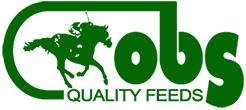Benefits of Beet Pulp for Horses
OBS Racing Blend is an equine athlete formula with beet pulp is a top of the line choice for racehorses.
OBS Racing Blend is the top of the line choice for racehorses. Moreover, it includes Beet pulp-based with steam crimped oats. Therefore it is a slight step up in energy density over Performance Blend.
- For horses in heavy training, yearlings, and sales prep.
- Beet pulp as a highly fermentable fiber and energy source.
- Yeast culture for optimal digestion.
- In Addition, it has Added vegetable oil for increased energy.
- A higher level of Vitamin E as an immunity booster.
- Added Lysine
- Also Contains Soybean hulls and selenium.
Benefits of Beet Pulp for Horses 
- Unique energy source
- It is a prebiotic
- Low Sugar
- Highly digestible
- Promotes a healthy Gut
- Great Source of Fiber
- Can help with weight gain
“Dried beet pulp products are usually available with or without added molasses. The sugar content of molasses beet pulp shreds is less than 10%, making it a safe feed for horses that need a low-sugar diet. Shreds with added molasses contain, on average, less than 15% sugar,” explained Crandell.
Furthermore, it is prebiotic. As in it is beneficial to the millions of microbes in the horse’s hindgut. A robust, well-functioning microbiome contributes to overall health. Despite its prebiotic benefit, beet pulp should never be the sole fiber source of the diet. Beet pulp is low in protein (typically 8-10% crude protein) and rich in calcium but is devoid of vitamins and low in other minerals. While research reported in Nutrient Requirements of Horses, published by the National Research Council, showed that a diet consisting of 45-55% beet pulp had no negative effects on the horses consuming it, beet pulp alone will not provide sufficient nutrients, noted Crandell.
Beet pulp can be used to help underweight horses gain weight, as it provides approximately 1,000 kcals per pound (one quart of dry beet pulp shreds weighs approximately 0.5-0.6 pounds). Byproducts of microbial fermentation of beet pulp in the hindgut include volatile fatty acids, or VFAs, which are absorbed and turned into energy. This energy does not cause a spike in glucose or insulin and is released slowly for a more steady supply. Beet pulp is a common ingredient in commercial grain concentrates because of its energy density and benefit to the microbiome.
Also, used as a top-dressed supplement. Soaking is recommended because the beet pulp holds moisture, making it useful for adding water to the digestive system*. Dry shreds will not swell in the throat or stomach when fed appropriately.
In Summary
In summary, beet pulp is an option for adding energy and promoting digestive health in horses. Contact a KER nutrition advisor for advice on whether beet pulp is right for your horse.
Ocala Breeders’ Feed and Supply strives to provide a knowledgeable, friendly staff that knows customers by name! Although we have grown over the years, a steadfast commitment to customer service remains. Product lines that meet the needs of our clientele make OBFS your one-stop shop for your farm and pet needs.
Sign up for our monthly newsletter and be the first to know about store specials, new products & upcoming events.
Like us on Facebook and follow us Instagram
Source: Kentucky Equine Research
